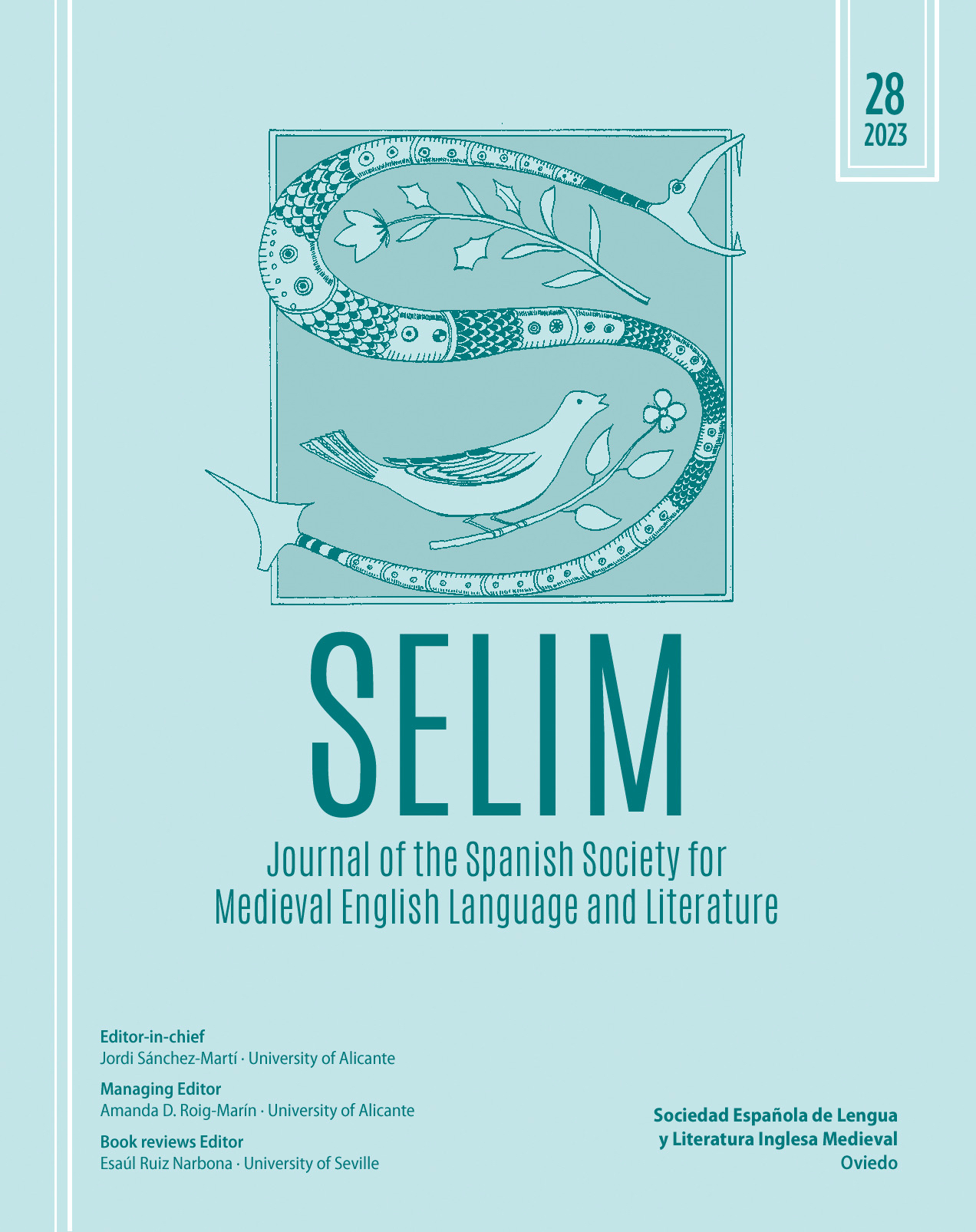Abstract
There were many ways of calling or naming a person, a place, or other things in Old English: se wæs noe gehaten ‘he is called Noah’, Ioppe hatte sum burh ‘a city was called Joppa’, æt þæm beorge þe mon Athlans nemneð ‘at the mountain which they name (precisely, one names) Atlas’, þe Grecas nemnað paralysis. and we cweðað lyftadl ‘which the Greeks call paralysis, and we call palsy’, his nama is iohannes ‘his name is John’, etc. A clear difference in the use of these verbs and expressions of calling is found between chronicles and homilies. Also, when the contents that describe the same object or theme like false god or the deadly sins, lexical variations or flexible uses of verbs can further become obvious. The aim of this study is to exemplify a variety of expressions of calling found in Old and early Middle English texts, especially in chronicles and homilies, which show syntactic and stylistic continuity with some morphological and lexical alterations. Tables are given to show the choice of each verb form used in each text.
References
Dictionaries
DOE(C) = diPaolo Healey, Antonette, et al. 2009–. Dictionary of Old English Web Corpus. Eds. Toronto: University of Toronto Press. Accessed November 11, 2021. http://www.doe.utoronto.ca.
MED = Kurath, Hans , Sherman M. Kuhn, John Reidy, and Robert E. Lewis, eds. 1952–2001. Middle English Dictionary. Ann Arbor: University of Michigan Press. Accessed November 11, 2021. http://quod.lib.umich.edu/m/middle-english-dictionary.
OED = Proffitt, Michael, ed. 1990–in progress. The Oxford English Dictionary, 3rd ed. Oxford: Oxford University Press. Accessed November 11, 2021. http://www.oed.com.
Editions
Bately, Janet, ed. 1980. The Old English Orosius. EETS, s.s. 6. London: Oxford University Press.
Bately, Janet, ed. 1986. The Anglo-Saxon Chronicle. A Collaborative Edition. Vol.3. MS A. Cambridge: D. S. Brewer.
Bethurum, Dorothy, ed. 1957. The Homilies of Wulfstan. Oxford: Clarendon Press.
Clemoes, Peter, ed. 1997. Ælfric’s Catholic Homilies, The First Series. EETS, s.s. 17. Oxford: Oxford University Press.
Day, Mabel, ed. 1952. The English Text of the Ancrene Riwle Edited from Cotton Nero A. XIV. EETS, o.s. 225. London: Oxford University Press.
Godden, Malcolm, ed. 1979. Ælfric’s Catholic Homilies, The Second Series, EETS, s.s. 5. London: Oxford University Press.
Irvine, Susan, ed. 2004. The Anglo-Saxon Chronicle. A Collaborative Edition. Vol. 7. MS E. Cambridge: D. S. Brewer.
Madden, Frederic, ed. 1847; rpt. 1970. Laʒamon’s Brut, or Chronicle of Britain. 3 vols. London: The Society of Antiquaries; New York: AMS.
Miller, Thomas, ed. 1891; rpt. 1959. The Old English Version of Bede’s Ecclesiastical History of the English People, EETS o.s. 95, 96. London: Oxford University Press.
Millett, Bella, ed. 2005–2006. Ancrene Wisse: A Corrected Edition of the Text in Cambridge, Corpus Christi College, MS 402, with Variants from Other Manuscripts. EETS, o.s. 325, 326. Oxford: Oxford University Press.
Morris, Richard, ed. 1868. Old English Homilies and Homiletic Treatises of the Twelfth and Thirteenth Centuries. First Series. EETS, o.s. 29. rpt. New York: Kraus Reprint, 1988.
Morris, Richard, ed. 1873. Old English Homilies of the Twelfth Century. Second Series. EETS, o.s. 53. rpt. New York: Kraus Reprint, 1981.
Morris, Richard, ed. 1967. The Blickling Homilies. EETS, o.s. 58, 63 and 73 in one volume. London: Oxford University Press.
Plummer, Charles, ed. 1892. Two of the Saxon Chronicles Parallel. 2 vols. rpt. Oxford: Clarendon Press.
Pope, John C, ed. 1967–1968. Homilies of Ælfric. A Supplementary Collection. 2 vols. EETS, o.s. 259, 260. London: Oxford University Press.
Scragg, Donald G., ed. 1992. The Vercelli Homilies and Related Texts. EETS, o.s. 300. Oxford: Oxford University Press.
Skeat, Walter W., ed. 1966. Ælfric’s Lives of Saints. EETS, o.s. 76 and 82 (Vol. I), 94 and 114 (Vol. II). London: Oxford University Press.
Thorpe, Benjamin, ed. 1844. Aelfric. Sermones Catholici in the Original Anglo-Saxon with an English Version. 2 vols. rpt. [1983] Hildesheim/Zürich/New York: Georg Olms.
Translations
Garmonsway, G. N. 1953. The Anglo-Saxon Chronicle. London: Dent & Sons.
Nicholson, Lewis E. 1991. The Vercelli Book Homilies. Translations from the Anglo-Saxon. Lanham: University Press of America.
Salu, Mary B. 1955. The Ancrene Riwle (The Corpus MS.: Ancrene Wisse). London: Burns & Oats.
Studies
Campbell, Alistair. 1959. Old English Grammar. Oxford: Clarendon Press.
Kaita, Kousuke. 2020. “Emergence of Middle English hōten, Meaning ‘to Promise’.” The Bulletin of Art and Science 549: 1–20.
Laing, Margaret. 1993. Catalogue of Sources for a Linguistic Atlas of Early Medieval English. Cambridge: D. S. Brewer.
Mitchell, Bruce. 1985. Old English Syntax, 2 vols. Oxford: Clarendon Press.
Ogura, Michiko. 2013. Words and Expressions of Emotion in Medieval English (Studies in English Medieval Language and Literature 39). Frankfurt am Main: Peter Lang.
Strite, Vic. 1989. Old English Semantic-Field Studies. New York: Peter Lang.

This work is licensed under a Creative Commons Attribution-NonCommercial-NoDerivatives 4.0 International License.
Copyright (c) 2023 SELIM. Journal of the Spanish Society for Medieval English Language and Literature.




